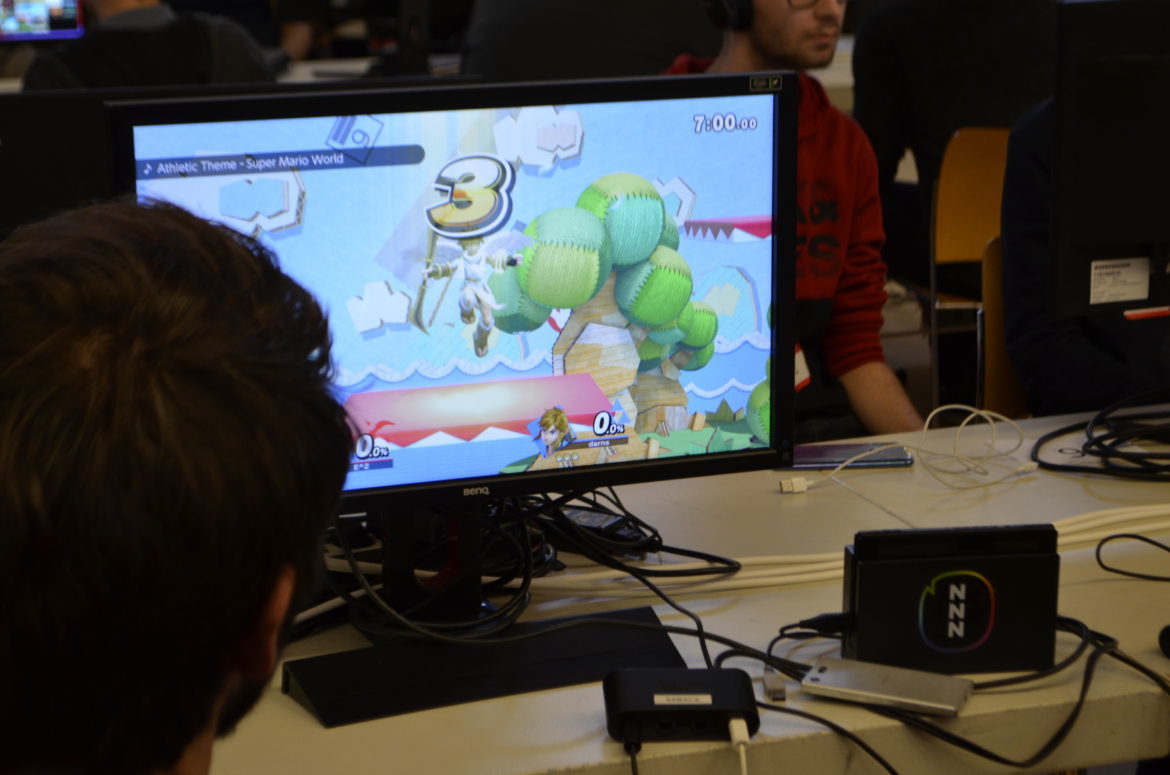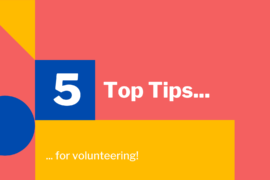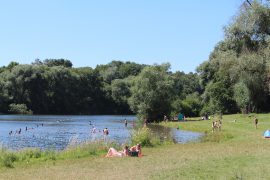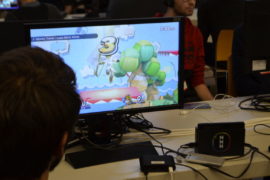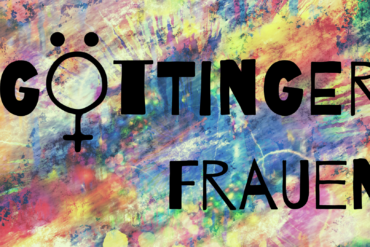E-sports… before the interview I was curious, whom I would actually meet. My idea of an e-sport athlete resembles more of a pale, skinny male, who knows a lot about computer science, spends days in the darkness of his room, and drinks energy drinks exclusively. Oh, and he knows everything about history. However that came to my mind, but maybe I will meet exactly one of those stereotypes? Or –maybe not. To find out more, I had coffee with Nils and Linus, two members of the university’s student group “E-sports Uni Göttingen”.
My first question regarding the formation of the group is answered quickly: “E-sports Uni Göttingen” is based on a student initiative that was first supported by the Creativity and Studies programme in early 2017. Only a few months later, the group was founded. The Creativity and Studies programme is a semiannual contest by the university, which promotes interdisciplinary and innovative student projects and ideas with financial aid.
Since their first steps in 2017, the group is steadily growing and has 15 members holding administrative functions and numerous players; how many exactly they cannot tell me. Because of the lack of member fees and accommodation, there is a high fluctuation of players.
E-sport at the university is not yet part of the Hochschulsport, the university’s sports department, which does not allow them to charge for memberships. Therefore, they can only receive funding by merchandise or selling snacks at events. In the end, they hope to become part of the Hochschulsport or at least financially independent, so they have a more steady income. Another problem of the e-sport community remains the refusal as a real sport by traditional athletes. Both Nils and Linus cannot understand their doubts about e-sport; although their sport “might not be a sport in a traditional sense” there are more than a few overlaps with others (more about that later). Besides, it is mentally just as challenging, similarly to chess, Linus claims.
The group is not solely focusing on one game. Now, there are seven games they are competing in: Counter-Strike: Global Offensive (CS:GO), Hearthstone, League of Legends (LoL), Overwatch, Rainbow Six: Siege, Rocket League und Super Smash Bros. Ultimate.
I want to know whether they are often confronted with prejudice, but both immediately say no. Most of the people they talk to about their hobby have either never heard of it or are simply not interested, which keeps the reactions rather neutral. People rarely make assumptions about an unhealthy lifestyle, potential for violent behavior, or other negative influences evoked by e-sports. By the way, both Nils and Linus do not conform at all to my idea of an e-sports athlete. Even when I provocatively ask them whether they also study something “nerdy”, I am more than surprised: Of course, some of them study something like physics, chemistry, or computer sciences, but there is still a high number of e-sports players in the humanities. Nils, for example is studying law, which, as part of the four-people managing board, he uses to be in charge of legal issues. His main task are organizational matters, meaning arranging appointments, creating gaming schedules, and planning events or establish connections to other teams in Germany or to sponsors. Linus is head of the Counterstrike team; there, he mostly organizes public viewings of the tournaments or recruiting new members. Later, he wants to give me a better understanding of the gaming aspects.
So far, neither of them resemble the e-sport athlete I had in mind with greasy hair, pale face and no sense of reality. Of course, it all sounds a bit nerdy, when they enthusiastically tell me about their hobby, but is it different from being into basketball, tennis or any other sports? What I personally appreciate is that they do not insist on comparing it to conventional sports. Although those mostly define themselves by physical activity of a person, e-sports requires similar forms of strategy and techniques. That is why I think it cannot be entirely distinguished but rather be seen as a different form of sport such as chess.
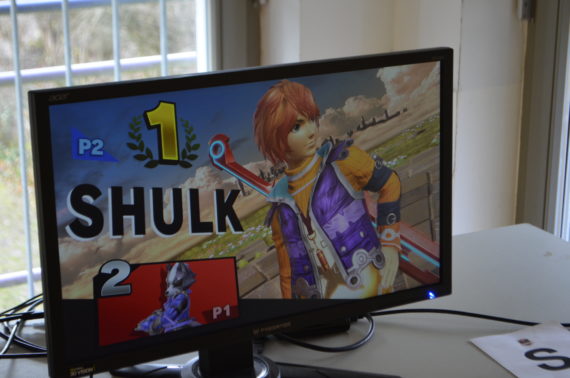
Surprisingly for me: There is not one but several university level leagues, the demand for e-sport must therefore be high –at least higher than I expected it at first. It does not mean that it is more established somewhere else compared to Göttingen. All of the e-sport initiatives seem to have struggles to find institutional support in contrast to traditional sport. There are three different divisions, where the E-sport Uni Göttingen group has each one team. Linus tells me that in the gaming title of CS:GO, approx. 40 teams of the university league have to compete with each other. Every gaming title has its own league, similar to soccer, handball or field hockey. Game days usually take place online, simply, because it would be too expensive to equip a location, as it is the case with professionals. In the long run, the goal of the group is to personalize the entire gaming process, especially to strengthen the teams. In order to secure at least a little team spirit, the group offers a community night twice a month, where all the teams can mingle and spend time together. But: not in front of the screens, rather at the Willi for a beer.
The teams are, regardless of the gaming title, set up similarly. There is one captain of the team, who analyzes the game, provides tactics and directs tasks to the teammates. Everyone else has one specific function as well; it is easily comparable to team sports. The time and efforts the members put into their hobby is enormous: practice three times a week and one game each weekend. However, it seems to pay off. In case they win in the university league, sponsors might award them with prices worth about 3000€.
Our drinks are almost empty. Before we leave, Nils summarizes their goals for me. Primarily, they aim to integrate e-sports more in Göttingen and establish acceptance and tolerance for it. Although they do not have any ambitions to become a professional team and enter professional leagues, they wish to become THE place to go in Göttingen when it comes to e-sports.
A few weeks later, Nils and I meet again at a Smash Bros. Ultimate Event. Until now, I could only imagine how these events would look like from their stories. However, my impressions of the room full of buzzing computers and clicking controllers exceed my expectations. In pairs of two, about 40-50 people are sitting at computers, staring excitingly on the screens. It is a much laid back but simultaneously concentrated atmosphere.
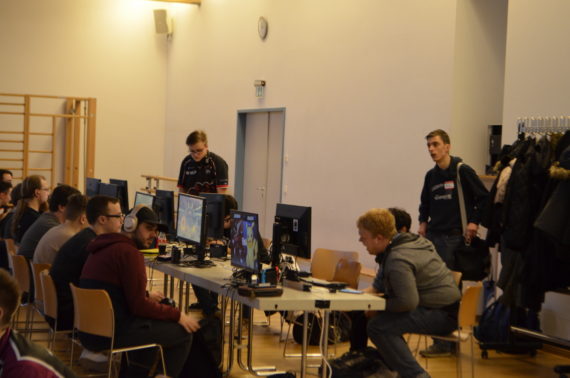
Next to the entrance, the head of the tournament has two tables where they sit and sell drinks. Not only energy drinks, to be fair. They welcome me nicely and tell me about the gaming processes. It is like the soccer world cup. There is a group stage, where everyone plays against everyone, and, in the end, the knock out rounds, which are shown on a huge screen and streamed live on twitch.
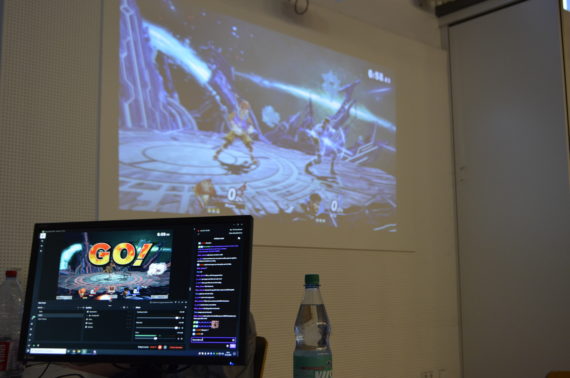
While I am taking pictures, I am a little surprised to be honest. Up until now, no one has mentioned people of other genders who are interested in e-sports. Here, a solid amount of women is sitting in front of the gaming screens as well.
Returning home, I reminisce about the talks with Nils and Linus, and the event itself. I am trying to think about the image of the e-sports athlete I had beforehand, and whether it still coincides with what I have seen. Sure, some of my prejudices were met, and I bet a few of the players knew a lot about history or science, but overall, it was quite a diverse group that I got to meet! My general understanding of sports remains unaltered, but I guess this was not the goal in the first place. Rather, I have concluded that it is indeed difficult to compare e-sports and traditional sports –they are so different and similar at the same time that they can easily stand on their own.

